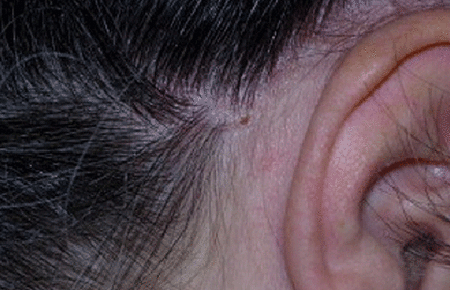Scalp psoriasis: Shampoos, scale softeners, and other treatments

If scalp psoriasis remains after using this type of treatment, a dermatologist can help. With a dermatologist’s assistance, it’s unusual for anyone to struggle to control scalp psoriasis for long, even when the psoriasis is severe. Dermatologists can help people who have itching, scaling, hair loss, and bleeding due to scalp psoriasis.
When you see a dermatologist, you receive a treatment plan tailored to your individual needs. Often a treatment plan will include more than one treatment. You may need to treat your scalp differently in the morning and evening. This can make treatment more effective and help reduce side effects.
The following may be part of your treatment plan for scalp psoriasis.
Medicine you apply to the scalp
This is the most commonly prescribed treatment. Your plan may include one or more of the following medicines.
Corticosteroids: This is the #1-prescribed treatment for scalp psoriasis in children and adults. Corticosteroids work quickly to reduce redness, swelling, itch, and scale. This makes it more effective than any other treatment that you apply to the scalp.
When used as directed, this medicine is safe. Because side effects can occur with long-term use, your dermatologist may recommend another treatment to use with the corticosteroid. This reduces possible side effects.
Medicated shampoos: This is often part of a treatment plan.
If you have stubborn scalp psoriasis, your dermatologist may prescribe a shampoo that contains clobetasol propionate. This can be quite effective when used in a shampoo. Studies show that patients can safely use this shampoo every day for up to four weeks. It’s also safe to use it once or twice a week to maintain results.
Gently shampoo
Rubbing, scrubbing, and scratching your scalp can worsen existing psoriasis.
Scale softeners: If the psoriasis on your scalp is thick, it can be hard for the treatment you apply to work. A product that contains salicylic acid can soften thick, stubborn patches. Other ingredients can also help.
Calcipotriene: Most people apply this manmade form of vitamin D to the scalp before going to bed. Your dermatologist may also recommend covering your scalp with a shower cap after applying the medicine. This helps the medicine penetrate the thick patches of psoriasis.
If you need stronger medicine, your dermatologist may prescribe a medicine that combines calcipotriene with a strong corticosteroid. This combination can also help reduce scalp irritation. Most people apply the medicine once a day for two weeks. It can be used longer if necessary.
Tazarotene: Most people apply a thin layer of this medicine to their scalp before going to bed. When they wake up, they shower it off. As with calcipotriene, a strong corticosteroid may be added to your treatment plan. This can help you have better clearing.
Tip for applying medicine
Lift your hair up and away when applying medicine to your scalp.

Coal tar: Used less often today, coal tar may be recommended if your scalp itches. If you shop for a psoriasis shampoo, you’ll find that some contain coal tar. The ones that contain a weaker concentration of coal tar, you can buy without a prescription.
Treatment you receive at a dermatologist’s office or clinic
If the psoriasis fails to clear with treatment applied to the scalp or you have thick psoriasis on your scalp, your dermatologist may recommend the following.
Injections of corticosteroids: Your dermatologist can inject a corticosteroid directly into the scalp psoriasis. While this can be effective, its use is limited to a few times.
Excimer laser and other light treatments: This laser can treat psoriasis in difficult-to-treat areas like the scalp, feet, and hands. When used to treat the scalp, your dermatologist may use a device that looks like a blow dryer. A benefit of using this to treat scalp psoriasis is that this laser treats only the areas that need it.
The drawback to this treatment is that you will need to travel to your dermatologist’s office or a psoriasis clinic two or three times per week. Each treatment session takes about 10 minutes. Most patients need to continue these visits for several weeks. If your schedule won’t permit this, be sure to tell your dermatologist.
While getting these treatments, you may also need to use another treatment at home.
Excimer laser treatment is usually painless, but possible side effects include redness and sunburn-like pain.
Strong psoriasis medicine
Scalp psoriasis can be stubborn. If you are following your treatment plan and not seeing results, your dermatologist may prescribe stronger medicine. This treatment attacks psoriasis where it starts, in your immune system.
Before treating scalp psoriasis with a biologic
This patient had an unbearably itchy scalp psoriasis, which failed to clear with medicine applied to the skin.

After treating scalp psoriasis with a biologic*
A biologic may be an option for some patients.
*Results may vary from patient to patient.

If this is an option, your dermatologist may prescribe one of the following:
Apremilast
Oral (taken by mouth) retinoid
Methotrexate
Cyclosporine
A biologic
Following your treatment plan is key to getting results
When working with a dermatologist, it is important to use the treatment exactly as prescribed and for as long as recommended. Many patients fail to see clearing because they stop following their treatment plan.
Images
Before and after treating scalp psoriasis: Photographs used with permission of the Journal of the American Academy of Dermatology. J Am Acad Dermatol 2008;58:614.
References
Al-Mutairi N, Al-Haddad A. “Targeted phototherapy using 308 nm Xecl monochromatic excimer laser for psoriasis at difficult to treat sites.” Lasers Med Sci. 2013;28(4):1119-24.
Bagel J, Lynde C, et al. “Moderate to severe plaque psoriasis with scalp involvement: A randomized, double-blind, placebo-controlled study of etanercept.” J Am Acad Dermatol 2012;67:86-92.
Chan CS, Van Voorhees AS, et al. “Treatment of severe scalp psoriasis: from the Medical Board of the National Psoriasis Foundation.” J Am Acad Dermatol. 2009;60(6):962-71.
Guenther L. “Current management of scalp psoriasis.” Skin Therapy Lett. 2015;20(3):5-7.
Paghdal KV, Schwartz RA. “Topical tar: Back to the future.” J Am Acad Dermatol. 2009 Aug;61(2):294-302.
Renton C. “Diagnosis and treatment of adults with scalp psoriasis.” Nurs Stand. 2014 Feb 26-Mar 4;28(26):35-9.
Wong, JW, Kamangar F, et al. “Excimer Laser Therapy for Hairline Psoriasis: A Useful Addition to the Scalp Psoriasis Treatment Algorithm.” Skin Therapy Letter. 2012;17(5)6-9.
 Atopic dermatitis: More FDA-approved treatments
Atopic dermatitis: More FDA-approved treatments
 Biosimilars: 14 FAQs
Biosimilars: 14 FAQs
 How to trim your nails
How to trim your nails
 Relieve uncontrollably itchy skin
Relieve uncontrollably itchy skin
 Fade dark spots
Fade dark spots
 Untreatable razor bumps or acne?
Untreatable razor bumps or acne?
 Tattoo removal
Tattoo removal
 Scar treatment
Scar treatment
 Free materials to help raise skin cancer awareness
Free materials to help raise skin cancer awareness
 Dermatologist-approved lesson plans, activities you can use
Dermatologist-approved lesson plans, activities you can use
 Find a Dermatologist
Find a Dermatologist
 What is a dermatologist?
What is a dermatologist?